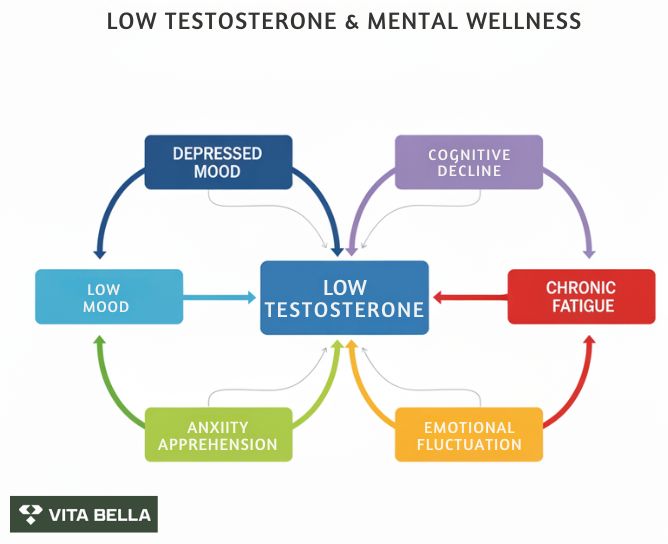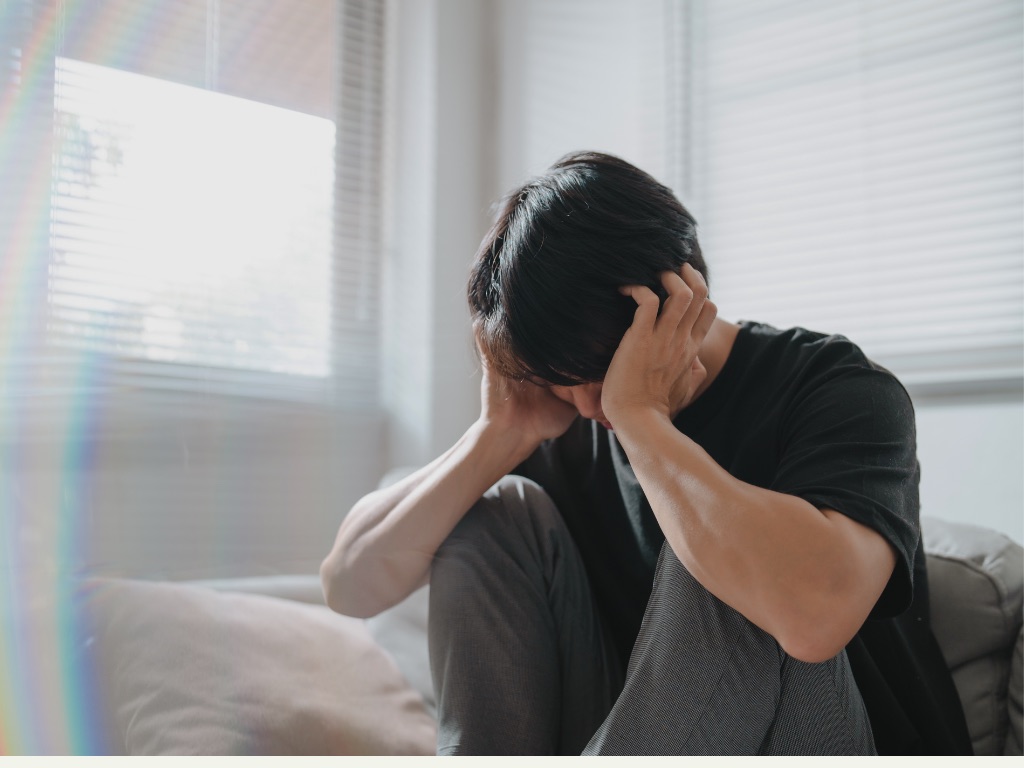Low testosterone 1 isn’t just a number on a lab report; it can quietly rewrite a man’s emotional script. In later years, when age and health conditions drive functional hypogonadism, the impact often stretches far beyond physical fatigue. Depression may show up not only as hopelessness or inactivity but even as darker thoughts of suicide.
At the center of this storm is testosterone, a hormone that shapes how we handle stress, threats, and even rewards, suggesting that its role in mental resilience is far more profound than most realize.
Low testosterone doesn’t just drain your body; it clouds your mind and emotions, too. Understand the root cause for your mental health issue. Explore Vita Bella’s trusted Testosterone therapies to restore balance, clarity, and confidence from the inside out.
What Is Low Testosterone?
Low testosterone, or male hypogonadism, occurs when the body produces insufficient testosterone, resulting in relative deficiencies in total and/or free testosterone levels. It can affect both physical, cognitive, and emotional health. Symptoms can range from fatigue, reduced libido, mood changes, and loss of muscle mass. Testosterone declines about 1–2% annually after age 30, and studies2 show that around 40% of men over 45 and up to 50% of men in their 80s experience Low T.
Mental health impacts such as depression, irritability, and “brain fog” 3 often go unnoticed because they overlap with aging or stress. Without proper testing of both total and free testosterone, these psychological effects remain underdiagnosed.
Emotional Effects of Low Testosterone
Low testosterone (hypogonadism) has been linked in cross-sectional and longitudinal studies with emotional disturbances, including mood swings, irritability, apathy, and risk of depressive symptoms.
Mood swings & irritability
A study1 explains that men with Low T report a wide spectrum of mood problems, from fatigue and listlessness to hopelessness and even suicidal thoughts. Moreover, irritability, emotional instability, and abrupt mood swings can be associated with low testosterone.
Depression risk
Another study 3 found specific depressive symptoms correlated with lower testosterone in both men and women. Epidemiological review 4 suggests 35-50% of those men with hypogonadism have depressive symptoms or impaired mood, fatigue, and low drive vs healthy controls.
Testosterone appears to influence neurotransmitters like serotonin and dopamine, which helps explain why emotional symptoms often emerge, yet are frequently overlooked in diagnosis.
Low motivation & apathy
Low testosterone in men often presents with non-specific symptoms like low energy, reduced drive, and decreased motivation, rather than classic sexual symptoms. Hypogonadal men <40 years frequently report “lack of energy” 5 as the strongest predictor of testosterone deficiency, highlighting its impact on daily motivation and energy.

Cognitive Effects of Hormonal Imbalance
Low testosterone has clear cognitive consequences, including brain fog, reduced concentration, and forgetfulness. Studies 6 show its role in the hippocampus, where deficiency contributes to memory decline, while supplementation can improve verbal and spatial recall. Hormonal imbalance also impairs executive function, slowing decision-making and processing speed 7.
To better understand the impact, let’s break down the key areas of cognition most influenced by hormonal imbalance:
Brain fog & concentration: Low testosterone is linked to impaired working memory, reduced attention span, and difficulty with mental clarity, often reported as “brain fog” 7 in aging men.
Memory issues: Testosterone influences the hippocampus, a key memory center in the brain6. Clinical studies show men with low T have poorer verbal and spatial memory, while supplementation can improve hippocampal-dependent tasks.
Focus & decision-making: Hormonal imbalance affects executive function, leading to slower processing speed and impaired decision-making 8. Testosterone therapy has been shown to enhance task performance in hypogonadal men.
Why These Symptoms Are Often Overlooked
Symptoms like brain fog, low motivation, irritability, or depressed mood commonly overlap with stress, age, sleep issues, or lifestyle factors, so they’re misattributed rather than linked directly to testosterone deficiency.
Many studies/methods 9 focus on physical symptoms (sexual dysfunction, fatigue, muscle loss), so emotional or cognitive signs frequently fall outside standard diagnostic criteria.
Physical symptoms like low libido, decreased spontaneous erections, fatigue, and muscle deterioration are frequently reported and are often the ones that push men to consult a doctor first.
Age‐related decline in testosterone (“late‐onset hypogonadism”) is strongly associated with visible conditions such as sarcopenia, metabolic syndrome, and obesity.
Psychological or emotional symptoms, mood fluctuations, depression risk, and low motivation receive less focus in clinical guidelines and patient‐reported outcomes. Because physical changes are easier to measure and more socially acknowledged, mental symptoms 10 are often underrecognized.
The Mind-Body Connection: Why Hormones Matter
Hormones serve as important messengers 11 linking brain and body function. For example, they help regulate stress via the HPA axis, influence neural plasticity in the hippocampus, and affect mood and behavior by balancing metabolic and steroid hormones. Disruption in these systems can produce lasting effects on cognition, mental health, and overall physical health.
Sleep loss and short sleep duration 12 correlate with lower morning, afternoon, and 24-hour testosterone levels, while disturbing the testosterone-cortisol balance and raising stress hormones.
Dietary restriction or poor nutrient 13 intake similarly reduces circulating testosterone.
Together, low T, disrupted sleep 14, and elevated stress can reduce motivation, worsen sleep, cause mood decline, which in turn worsens hormonal decline, creating a vicious cycle.
Stop Ignoring the Silent Mental Toll of Low T
Brain fog, memory lapses, or motivation crashes often go unnoticed and untreated. Left unchecked, they can impact relationships, work, and emotional health. Vita Bella takes a holistic approach, offering personalized low T assessments and evidence-based therapies that protect both your physical and mental health through testosterone supplementation.
FAQs
1. Can low testosterone really affect my mood and mental health?
Yes. Research shows that low T can disrupt neurotransmitters like serotonin and dopamine, leading to mood swings, irritability, and even depression.
2. How do I know if my mental health symptoms are linked to low testosterone?
Suppose you experience persistent fatigue, low motivation, brain fog, or depressive symptoms alongside physical issues like reduced libido or muscle loss. In that case, it may be related to low T. A blood test is the most reliable way to confirm.
3. Can treating low testosterone improve emotional health?
Clinical evidence suggests that testosterone therapy can improve mood, energy, and cognitive function in men with confirmed deficiency, though it must be carefully monitored by a healthcare provider.





















